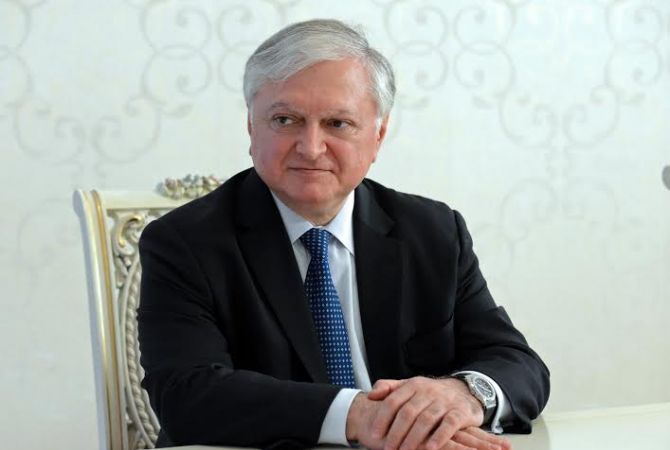Edward Nalbandian’s interview with “Armenpress”: Francophonie, Karabakh conflict, refugee crisis
 10:25, 9 October 2015
10:25, 9 October 2015YEREVAN, OCTOBER 9, ARMENPRESS. Armenia Minister of Foreign Affairs Edward Nalbandian gave an exclusive interview to “Armenpress” ahead of the Ministerial Conference to be held in Yerevan October 10-11. During the interview Minister Nalbandian spoke about Armenia- Francophonie relations, his expectations from the conference as well as the approaches of Francophone countries towards the Nagorno Karabakh conflict.
Will you, please introduce the grounds for rapprochement between Armenia and La Francophonie?
First of all, there is attachment to French culture and language which, indeed, has its influence on our perceptions of La Francophonie. There also exist historically intertwined firm ties and deep feelings of friendship between France and Armenia which brings together the two peoples. It is not incidental that the relations between Armenia and France are described as privileged.
Francophilia which is widely spread in the Armenian society is accompanied with a special attitude toward French culture, which is the foundation of Francophonie development in Armenia. To the latter equally contribute the existence of close ties between Armenia and such countries as Canada, Belgium, Greece, Cyprus, Lebanon, Egypt and many others.
All of these incentives have laid foundation for the rapprochement between Armenia and La Francophonie.
We have witnessed transformations in La Francophonie during the last two decades: the creation of the International Organization of La Francophonie, election of Boutros Ghali as the first Secretary-General of the International Organization of La Francophonie in 1998. The latter transformations spoke of the readiness of the International Organization of La Francophonie to be an active player in the international arena.
Through the adoption of Bamako Declaration of Human Rights and Democracy in 2000 La Francophonie expressed its will about making an address of universal significance.
La Francophonie is an organization of solidarity and cooperation in the framework of which the member states and governments are capable of developing on equal grounds their relations in the spheres of economy, politics, culture and trade.
La Francophonie continues its expansion also due to the countries where despite the fact that French is not an official language, cultural and linguistic diversity is considered one of the priorities.
What are your expectations from the Ministerial Conference to be held in Yerevan October 10-11?
President Serzh Sargsyan will open the 31st Conference of Ministers of the International Organization of La Francophonie. This conference will provide a possibility of exchanging thoughts over topical issues. The central issues are political crises which have not passed by Francophone countries.
The issues of the mobility and the vulnerable status of refugees and immigrants which give rise to concerns are also on the agenda.
In this regard, I want to note that Armenia did not stay on the sidelines and has accepted over 17000 refugees from Syria.
First of all, our obligation is to respect the dignity of the refugees and those displaced as well as ensure their protection which is established in “Déclaration de Saint-Boniface”. There is also the scourge of terrorism in the form of Daesh and other terrorist groups which threaten the civilized world. It is necessary to relentlessly struggle against this evil.
These issues will occupy crucial part during the discussions of the Ministerial Conference to be held in Yerevan.
This year, more than ever the centennial of the Armenian Genocide points out that there’s a necessity of taking measures for the prevention of such crimes committed against humanity.
Another issue which is of vital importance to us and which is also on the agenda, refers to the struggle against climate changes to which Paris Climate Change Conference in November will be dedicated.
In this context, I’d like to express my appreciation of the high-level meeting in New York on September 28 which was dedicated to the abovementioned issues held under the auspices of President Macky Sall, President of Senegal.
In this connection, we will come up with a corresponding initiative during the Ministerial Conference in Yerevan together with France and Madagascar.
All of this testifies to the consolidation between Francophone countries which will be the pledge for the success of the conference.
Can you, please, present the approach of the International Organization of La Francophonie toward the issues of our region?
The Nagorno Karabakh conflict is constantly in the centre of the attention. In this regard, it is important to touch upon the latest developments of the Nagorno Karabakh conflict and express our concerns over the ceasefire regime violations on the part of Azerbaijan which resulted in the death of many people. We grossly condemn such escalations of the situation.
Azerbaijan’s continual refusal of the Minsk Group Co-chairs’ proposals related to conflict settlement, growing frequency of premeditated military aggression, refusal of the OSCE Minsk Group Co-Chairs’ proposal to create mechanism of investigation of ceasefire violation testify that Azerbaijan takes the responsibility for the escalation of the situation. Baku impedes the efforts of the international community directed towards peaceful settlement of the conflict.
Armenia continues to be constructively integrated into the negotiation process and makes efforts with the OSCE Minsk Group Co-Chairs aimed at the peaceful settlement of the conflict.
During La Francophonie Summit, held in Dakar, heads of member states and governments offered their unconditional support to the OSCE Minsk Group Co-Chairs efforts in Nagrno Karabakh conflict settlement.
They also urged all the parties of the conflict to refrain from use of force or threat of its use which can put the settlement process in danger, continue the negotiations based on the OSCE Minsk Group Co-Chairs’ proposals which are a unified whole and include the principles of non-use of force or threat of force, territorial integrity, equal rights and self-determination of peoples as basics for the fair and permanent settlement of the conflict.





















